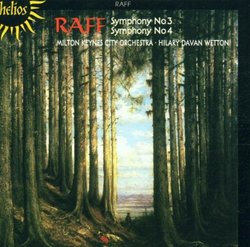| All Artists: Joachim Raff, Hilary Davan Wetton, Milton Keynes City Orchestra Title: Raff: Symphony No. 3; Symphony No. 4 Members Wishing: 0 Total Copies: 0 Label: Hyperion UK Release Date: 8/10/1999 Album Type: Import Genre: Classical Style: Symphonies Number of Discs: 1 SwapaCD Credits: 1 UPC: 034571150178 |
Search - Joachim Raff, Hilary Davan Wetton, Milton Keynes City Orchestra :: Raff: Symphony No. 3; Symphony No. 4
 | Joachim Raff, Hilary Davan Wetton, Milton Keynes City Orchestra Raff: Symphony No. 3; Symphony No. 4 Genre: Classical
|
Larger Image |
CD Details |
CD ReviewsRaff doesn't deserve obscurity 10/29/1999 (4 out of 5 stars) "In his lifetime, Joachim Raff's symphonies were considered the best available before Brahms came on the scene. Brahms blew Raff off the radar screen and little has been heard of hims since.This is a terrible shame, as Raff's music is tuneful, charming and certainly on the level of Mendelssohn. Raff has a great ear for orchestral colour and knows how to write a memorable melody. If he has a weakness, it's that his pieces tend to wander a bit. He was, after all, trying to combine symphonic form with the symphonic poem ideal espoused by Liszt. And frankly, his music is more entertaining than Liszt's orchestral music which grows boring with it's inability to develop his ideas.This disk is a great place to start when looking into Raff. The 3rd is widely considered Raff's best piece, but the 4th is memorable as well. The playing and sound are terrific. It's too bad that Hyperion didn't continue to record a Raff cycle.If you liked this, try the 5th symphony next. Also worthy are Symphonies Nos. 6, 8 & 9 and the wonderful Piano Concerto." The forest is welcoming! Robert Thomas | Los Angeles, CA | 05/31/2006 (5 out of 5 stars) "QUESTION-If a symphony takes place in a forest and nobody hears it, did it really happen? ANSWER- For over a hundred years, the answer was no. Fortunately, recordings of Raff's symphony No. 3 (In the Forest), as well as his others, are becoming available on CD's like this one. There is an abundance of great music to be heard here. Raff is a supreme melodist, and these 2 symphonies are a veritable tune-o-rama of memorable themes and motifs, ranging in emotion from plaintive largos to stately andantes to positively riveting allegros. The 3rd may be considered one of Raff's greatest masterworks, but don't be surprised if you experience the 4th with equal enjoyment. The 2nd movement of that symphony is reminiscent of Beethoven and comes off like an edge of your seat, nail-biting thrill ride. The 4th movement actually begins with a verbatim quote from the final movement of Beethovens 9th symphony, before turning in a completely different, much lighter direction. The stolen quote is an obvious homage, and is guaranteed to bring a smile to your face. One final note. A reviewer below comments on the bottomless sound of the orchestra featured on this disk. There is some truth in that comment, however, the liner notes state that this is an intentional treatment by the conductor to bring out the heavy demands of the violins in these symphonies. Don't hesitate to make this disk a part of your collection. Highly recommended. Enjoy!" Sounding Effortless John D. Pilkey | Santa Clarita, CA USA | 02/08/2007 (5 out of 5 stars) "Along with Anton Rubinstein, Raff is known as a Mendelssohnian despite his work with Liszt. In the context of German romanticism, Mendelssohn stands for a degree of classical formality. Brahms is also known as a romantic-classicist, but his music sounds very different from Raff's and Rubinstein's because of its quality of ardent effort-- even labor-- that he acquired from the example of Beethoven. By the standard of Beethoven and Brahms, Mendelssohn, Raff and Rubinstein sound elegant and effortless. Rubenstein was a cosmopolitan type who made little of his identity as a Russian and incurred the wrath of Russian nationalists like Mussorgsky by claiming that they were struggling amateurs. It's that striving quality that won the day by impressing critics as the mark of genius.
The conflict of values between the schools of Mendelssohn and Beethoven-Brahms recalls the theme of Robert Browning's dramatic monologue "Andrea del Sarto" where the poet exaggerates the nerveless perfectionism of that High Renaissance painter and contrasts it with the more inspired Raphael. When critics wish to give measured credit to a smooth composer like Rubinstein or Raff, they sometimes damn their work with faint praise by calling it "charming." Raff's music, however, is too dignified to dismiss as "charming" or "tuneful." He was no pop composer. Granted that he does not achieve the fiery quality of Brahms D minor Piano Concerto or F minor Piano Quintet, he achieves dignity in a quieter but equally valid way. Instead of emphasizing musical conflict and drama, Raff creates a sensation of narrative-- the quieter art of fiction, no less stimulating to a sensitive imagination. From the opening bars of the G minor Symphony No. 4, I sense that I am being introduced to a good story with a bracing, wholesome theme and a historically significant setting. The melody is not just "tuneful" but evocative. It makes me want to "camp out" in this music. In a customer review of the Stadlmair performance of Raff's Symphony No. 6, I propose a little story about hunting mountain trolls in order to suggest this sensation of narrative engagement. Raff's theme of the first movement of Symphony No. 4 is perhaps the most engaging of all his themes and a good introduction to the essence of his music." |

 Track Listings (8) - Disc #1
Track Listings (8) - Disc #1